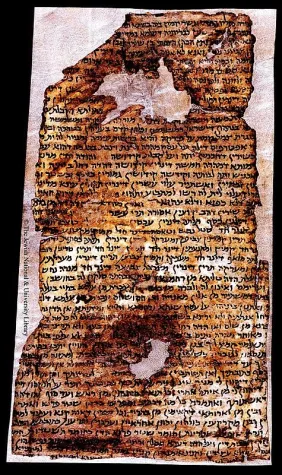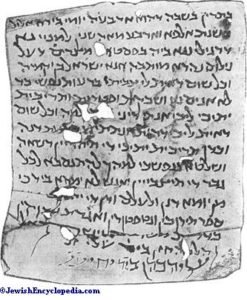Joseph’s Dilemma With Mary
Joseph’s behavior affected the Nativity story much more than it may seem. His reactions to the extreme circumstances surrounding Mary’s pregnancy reveals truths about her as well as himself.
Most likely Joseph knew Mary through community interactions in Nazareth such as during the harvest or through their Synagogue.[1] He would have been familiar with her family’s reputation and had confidence that she was a marriageable virgin, a very important factor in their conservative Jewish society.[2]
Betrothals typically lasted for a year during which time Joseph was expected to be very busy.[3] As a bridegroom, in addition to paying the traditional bride-price, he had to make money for other financial obligations such as preparing their new home and sponsoring a 3-day wedding feast for their guests.[4]

Initially, Joseph had few worries about the virtuous nature of his prospective bride. By law, a marriage contract called a ketubah legally declared Mary to be a virgin; the terms of their marriage; and it was signed by the witnesses who vetted Mary.
Mary had less commitment pressures to prepare for the wedding … simply follow the rules of the process. A betrothed girl subject to Judaic Law was under strict supervision of her family and the watchful eye of the community. She was not allowed to be alone at any time with an adult male, not even a male family member.[5]
During his appearance to Mary delivering God’s message that she was miraculously pregnant, Gabriel the archangel, also informed Mary that Elizabeth, her cousin, was 6 months pregnant. With a common unique situation, it seemed to be the perfect opportunity to visit Elizabeth who lived in a village about 6 days away near Jerusalem.[6]
Mary would be gone for 3 months. Keeping in touch with Joseph would be very limited and delayed, if at all.[7]
Joseph would not become aware of Mary’s pregnancy until sometime after her return to Nazareth. It is unclear exactly when he discovered that she was pregnant, but it is clear from Matthew‘s use of the Greek word heurisko meaning “to hit upon…to find (by chance)” that it was a big surprise when he did find out![8]
Overwhelming emotions by Joseph would be expected – hurt and anger followed by resentment, embarrassment, doubt, uncertainty, temptations of vengefulness and other mixed feelings. Then the big question – what to do next?
Knowing he was not responsible for Mary’s pregnancy, there were two huge consequences to consider. First is the obvious, why would a bridegroom want to marry his bride-to-be who was carrying a child fathered by someone else?
Joseph had the legal recourse of a divorce during their betrothal. For him, it was a legitimate escape avenue for Mary’s seemingly obvious indiscretion and Jewish law favored his position – he only had to make the accusation of adultery.[9]
Very strong circumstantial evidence supported such a charge. Joseph just needed to point to Mary’s state of pregnancy that began while she was out-of-town on a 3-month trip without him to visit her cousin, Elizabeth.[10]
His reaction to the situation is perhaps the most telling evidence of a truth that Joseph was not the father of Mary’s child. Playing the divorce card would also have immediately ended the royal inheritance rights of the unborn Jesus.[11]
Consequences of a divorce weighed heavily on Joseph. Not only would it destroy Mary’s reputation and cause financial loss to both Mary and her family, a public accusation of infidelity could carry a charge of adultery – stoning would not have been out of the question.[12]
Attesting to Joseph’s honorable character, he was seeking to quietly settle the divorce. It would, in effect, minimize embarrassment to Mary, her family and avoid the public charge of adultery.[13]
Moving forward with the marriage had many downsides although it would be the expected behavior of a man who believed himself to be the father of his betrothal’s baby. Frowned upon by the Rabbis, accidental pregnancies during betrothals were a reality, even in those days. The Rabbi’s dealt with these instances by allowing the couple to move up their wedding date and get on with life as a married couple.[14]

If Joseph stayed with his pregnant betrothal, their community of family, friends and neighbors would assume the pregnancy was a result of his own doing, even if it wasn’t. Joseph would have to endure the undeserving consequences of facing public scorn and humiliation while swallowing his pride and overcoming his personal feelings.
It would take a big man. Few men would do it. Unexpectedly, Joseph decided not to pursue a divorce.
Joseph set aside all his negative emotions and feelings to honor his marriage commitment to Mary knowing he was not the father of her child while willingly accepting the consequences that would come with it. What caused this sudden change of heart was not to be expected.
Matthew reports the game-changing moment came from a visit by “an angel of the Lord.” He delivered a message from God telling Joseph that Mary’s conception was from the Holy Spirit, her child would be a boy to be named Immanuel which Joseph understood to mean “Jesus.”[15]
Actions speak louder than words, volumes in this case. Something very unusual and significant happened.[16] Did Joseph’s behavior play a key role in determining if the conception and birth of Jesus of Nazareth was a fulfillment of the Isaiah 7:14 prophecy?
Updated November 15, 2023.
This work is licensed under a Creative Commons Attribution-NonCommercial-NoDerivatives 4.0 International License.
REFERENCES:
[1] Brayer, Menachem M. The Jewish Woman in Rabbinic Literature. 1986. pp 68-69. <http://books.google.com/books?id=GhPxFOCdQj4C&pg=PA143&lpg=PA143&dq=sex+betrothal+jewish&source=web&ots=G4jLlub8y9&sig=gnkOuPI8xLKvYl57J9PR9VY3kVg#PPA143,M1>
[2] Deuteronomy 22:15, 19. Brayer. The Jewish Woman in Rabbinic Literature. pp 57, 59, 61. “Marriage Laws.” Jewish Encyclopedia. 2011. <http://jewishencyclopedia.com/articles/10435-marriage-laws>
[3] “Betrothal.” Jewish Encyclopedia. 2011. <http://jewishencyclopedia.com/articles/3229-betrothal> Brayer. The Jewish Woman in Rabbinic Literature. p 62. Edersheim. The Life and Times of Jesus the Messiah. 1883. Book II, Chapter 4. https://philologos.org/__eb-lat/book204.htm> Thompson, James C. Women in the Ancient World. July 2010. “Women in Ancient Israel” > “Women and the Law in Ancient Israel.” <http://www.womenintheancientworld.com/women%20and%20the%20law%20in%20ancient%20israel.htm>
[4] Soncino Babylonian Talmud. Ed. Isidore Epstein. Kethuboth 3b. 1935-1948. <https://israelect.com/Come-and-Hear/kethuboth/kethuboth_3.html> Missler, Chuck. “The Wedding Model.” Koinonia House, Inc. 2018. <http://www.khouse.org/articles/2003/449/#notes> Brayer. The Jewish Woman in Rabbinic Literature. p 70. “Marriage Contract for Shelamzion and Judah.” K. C. Hanson’s Collection of Greek Documents. 128 AD. photo. <http://www.kchanson.com/ANCDOCS/greek/marrcon.html>
[5] Soncino Babylonian Talmud. Kethuboth 12a, 12b, 13a, 13b. <https://israelect.com/Come-and-Hear/kethuboth/index.html> “Adultery.” Jewish Encyclopedia. 2011. <http://www.jewishencyclopedia.com/articles/865-adultery> Brayer. The Jewish Woman in Rabbinic Literature. pp 142-143.
[6] Luke 1. “Map of Israel in the Time of Jesus.” Bible History Online. n.d.<https://www.bible-history.com/maps/palestine_nt_times.html>
[7] Luke 1.
[8] Matthew 1:18. Net.bible.org. Greek text. “heurisko <2147>.” Lexicondorance.com. <http://lexiconcordance.com/greek/2147.html>
[9] “Adultery.” Jewish Encyclopedia. 2011. <http://jewishencyclopedia.com/articles/865-adultery>
[10] Matthew 1:18, 39-43; Luke 1:39, 56. Edersheim. The Life and Times of Jesus the Messiah. p 586. “Adultery.” Jewish Encyclopedia. 2011. Brayer, Menachem M. The Jewish Woman in Rabbinic Literature. pp 192-193. <http://books.google.com/books?id=GhPxFOCdQj4C&pg=PA143&lpg=PA143&dq=sex+betrothal+jewish&source=web&ots=G4jLlub8y9&sig=gnkOuPI8xLKvYl57J9PR9VY3kVg#PPA143,M1>
[11] Matthew 1:19. “Divorce.” Jewish Encyclopedia. 2011. <http://jewishencyclopedia.com/articles/5238-divorce> Edersheim, Alfred. The Life and Times of Jesus the Messiah. 1883. Book II, Chapter 4. <http://philologos.org/__eb-lat/default.htm
[12] Deuteronomy 22:20-21, 23-24. John 8:2-7. “Adultery.” Jewish Encyclopedia. “Marriage Laws.” Jewish Encyclopedia. “Marriage Ceremonies.” Jewish Encyclopedia. 2011. <http://jewishencyclopedia.com/articles/10434-marriage-ceremonies> Josephus, Flavius. Against Apion. Book II, #25. Trans. and commentary William Whitson. The Complete Works of Josephus. 1850. <http://books.google.com/books?id=e0dAAAAAMAAJ&printsec=frontcover&source=gbs_ge_summary_r&cad=0#v=onepage&q&f=false> Thompson,“Women in the Ancient World.” Edersheim. The Life and Times of Jesus the Messiah. Book II, Chapter 4.
[13] Matthew 1:19. Schneerson; Menachem M. “The Betrothed.” Chabad org. 2018. <http://www.chabad.org/parshah/article_cdo/aid/296931/jewish/The-Betrothed.htm> “Marriage Ceremonies” & “Adultery.” Jewish Encyclopedia.
[14] Brayer. The Jewish Woman in Rabbinic Literature. pp 143-144, 146-147. Lamm, Maurice. The Jewish Way in Love & Marriage. 2018. Section “Celebrating the Marriage Covenant” > Chapter “Jewish Betrothal Blessing;” Section “The Structure of The Marriage Covenant” > Chapter “The Jewish Marriage Ceremony.” <http://www.chabad.org/library/article_cdo/aid/465140/jewish/The-Jewish-Way-in-Love-Marriage.htm> Edersheim. The Life and Times of Jesus the Messiah. Book II, Chapter 4, footnote #27. “Ḳiddushin.”’ Jewish Encyclopedia. 2011. <http://jewishencyclopedia.com/articles/9310-kiddushin>
[15] Matthew 1.
[16] Edersheim. The Life and Times of Jesus the Messiah. Book II, Chapter 4.
